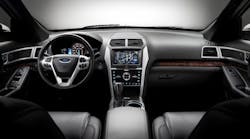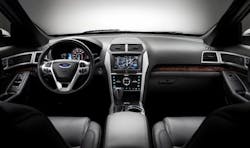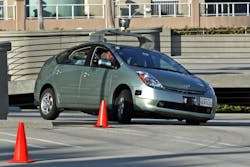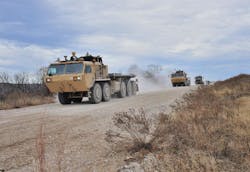[And this is going to be a very big deal in trucking, mind you: you can check out examples here and here to see what I mean.]
I’ll say right now that I’m not too pleased with where these folks think things are heading, especially as a majority seem to believe critical components such as steering wheels, throttle and brake pedals are going to disappear by 2035. [And frankly, there’s been some pushback against driverless vehicles, too, that you can read about here.]
Hey, I WANT a steering wheel in a vehicle – and a brake pedal for that matter! “Autonomous” technology may be all well and good for buses, trains, and the like, but if I want to go somewhere in my car I actually want to be able to drive it there!
Interestingly, though, it’s attitudes like mine that are creating what those experts refer to as the six largest possible “roadblocks” to the mass adoption of driverless cars. The big ones are legal liability, policymakers, and consumer acceptance, while cost, infrastructure, and technology are viewed as the smaller “speed bumps” to the adoption of autonomous vehicles.
"Anytime you have a technology that has the potential to fundamentally change our daily lives, laws and policies need to be established to ensure the technology is going to be used properly and benefit humanity. This is especially true with intelligent vehicles," noted Yaobin Chen, IEEE Senior Member and professor and chair of electrical and computer engineering at Purdue School of Engineering and Technology.“Once the foundational elements, like legal liability and policy, are in place, the technology and infrastructure will be there, so intelligent vehicles will become more widely accepted,” Chen said.
IEEE conducted this poll during its Intelligent Vehicle Symposium in Dearborn, MI, from June 8 through 11 and discerned that most of those surveyed believe that as more autonomous features are incorporated into cars, it will enable them to be manufactured without some of the standard equipment that is commonplace today.
When asked to specify the year in which specific equipment will be removed from mass-produced cars, the majority of respondents believe rearview mirrors, horns, and emergency brakes will be removed by 2030, with steering wheels and the gas/brake pedals following by 2035.
[Impertinent Editor’s Note: Still REALLY NOT liking this idea AT ALL. Yet I may be in the shrinking minority on this topic as many others see this and other technologies taking off in a big way -- this article here shows you what I mean.]
In addition, more than 75% of respondents also indicated that all 50 U.S. states would pass legislation permitting use of driverless vehicles within this time period.
"We've seen incredible growth in the driverless vehicle industry over the past few years, both in technological advancement and manufacturer acceptance, that has dramatically affected the consumer adoption timetable," pointed out IEEE Fellow Alberto Broggi, professor of computer engineering at the University of Parma in Italy, and founder of VisLab."The scientific community and car manufacturers have been working together to incrementally include autonomous features in modern day cars, with the intention of producing driverless vehicles in the near future,” he added. “For mass adoption, it's important that we begin trusting this technology."
[FYI: You can read about the U.S. military's work with autonomous vehicles or "robot trucks" by clicking here.]
Advancements in technology will be the most instrumental in the continued development of driverless vehicles, according to IEEE’s poll, with more than half (56%) of respondents to its survey believing that sensor technology is most essential, followed by software (48%), what are being dubbed “Advanced Driver Assistance” systems (47 %) and GPS (31%).
"A driverless car needs a constant stream of information of the road and its environment to make calculated decisions, which are referred to as perception. Sensors are one of the most important and trusted technologies for advancing perception scenarios," noted Christoph Stiller, IEEE member and professor at Karlsruhe Institute of Technology in Germany. "Sensors are small, non-intrusive and offer reliable data. Also, sensor technology is relatively cheap and will be influential in creating affordable driverless vehicles."
Along with sensors, creating digital maps of the road is a necessary function for allowing autonomous vehicles to travel safely on the roads. When asked to predict how long it will be before a complete digital map of the world will exist, nearly three quarters (74%) of respondents indicated these maps will be available within the next 15 years.
While autonomous cars will prove to be beneficial around the global, the majority of experts (54%) believed that North America would most benefit from driverless vehicles, with Europe second (28%) and Asia (17%) rounding out the top three.
Still … no steering wheel? I just don’t think I can get used to that idea one bit.






